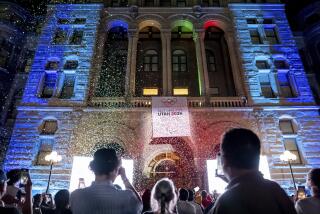Flaky Weather Puts Downhill on Hold
- Share via
HUNTSVILLE, Utah — The world’s best downhill racers made fast tracks Saturday down the snowy slopes of Snowbasin.
Unfortunately, there is no World Cup event known as “recreational powder skiing.”
The paradox of ski racing is that you need snow to race, yet too much snow can undermine a competition.
This was supposed to be a sneak-peek weekend, a three-race test on the course that will be used next February at the 2002 Salt Lake City Games.
Instead, racers revisited the horrors of the 1998 Nagano Games, when bad weather led to numerous postponements and forced organizers to double-up on events in order to complete the Alpine schedule.
With unwanted snowfall wiping out a second World Cup downhill at Snowbasin, and the prospect growing dim the course can be readied in time for a makeup downhill today--the originally scheduled super-giant slalom has already been scratched--organizers are getting a different kind of sneak preview.
“Oh, yeah, something like this could happen at the Olympics, unless we put a dome over the mountain,” said Bill Egan, coach of the U.S. men’s ski team.
The chances for racing today?
“Not great,” Egan said. “It’s going to take a heroic effort.”
And cooperation from the weather.
Bernhard Russi, the former Olympic champion who designed the downhill course, was anxious to see how his hill stood up under international competition.
“Yes, I’m a little bit disappointed,” he said, “but first, I’m a mountain man. I know what can happen in the mountains and what can happen in winter.”
Russi said training runs on Wednesday and Thursday were enough to indicate the “Grizzly” course is Olympic caliber.
One person with a positive spin on events was Herwig Demschar, the SLOC Alpine director.
Demschar, a former Austrian and U.S. coach, is in charge of preparing the downhill course.
“My opinion is that it’s super training for us,” Demschar said. “We’ve had to prepare the course three, four, no, six times. We’re going to be absolutely ready next year.”
Demschar said more than 450 workers have worked around the clock this week to get the downhill course in shape, but too much snow has made that an impossible task.
While fresh powder is great for recreational skiers, it is a race-wrecker for a downhill course, which has to be meticulously tended and groomed.
American Daron Rahlves, the world champion in super-giant slalom and one of next year’s medal contenders in the speed events, made the best of Saturday’s cancellation.
“Pretty much all of the guys grabbed their powder skis and we skied everywhere--I mean everywhere,” Rahlves said. Demschar said this weekend wipeout does not spell doom for next year’s Olympics. Unlike this weekend’s fixed schedule, next year’s Alpine events have several “built-in” off days to account for possible postponements.
How much snow will fall next year is anyone’s guess.
The average snowfall for the region in February has ranged from a low of 17 inches in 1987-88 to a high of 104 inches in 1985-86.
An estimated 80 inches have fallen so far this month.
In ski racing, you must always have a “plan B.”
If no races can be completed this weekend, Egan said the U.S. team almost certainly will return to Snowbasin in March for some postseason training.
More to Read
Go beyond the scoreboard
Get the latest on L.A.'s teams in the daily Sports Report newsletter.
You may occasionally receive promotional content from the Los Angeles Times.







